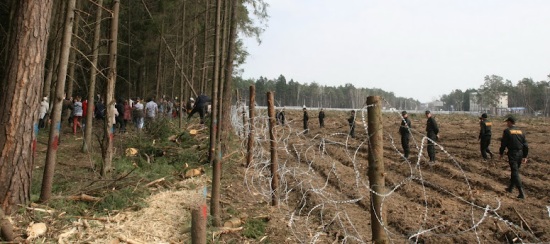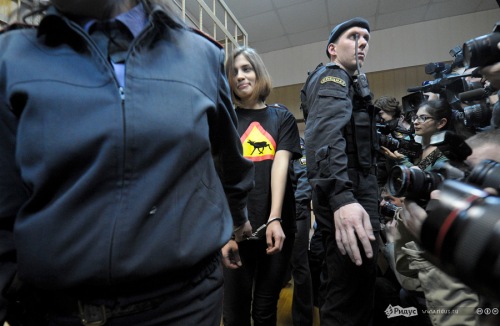Translation of speech by bloquonslahausse.com/ English translation of Gabriel Nadeau-Dubois’s historic March 22nd, 2012 speech to the students. Gabriel Nadeau-Dubois is the spokesperson for the Large de l’Association pour une Solidarité Syndicale Étudiante (CLASSE) bloquonslahausse.com/. I made this translation with the help of my friend Francis for the Anglophone students who asked for more English coverage of the student strike. Very proud to have Gabriel as our spokesperson.
In recent weeks, I have been fortunate to do several interviews on television, on the radio and in the newspapers, repeating the claims of the student movement, but today … today is a unique moment for me because we are in the hundreds of thousands in the streets, and the strikes are not happening on television sets. The strike is happening in the streets! In recent weeks, the media, the Minister of Education, Mrs. Beauchamp, Minister of Finance, Mr. Bachand and Prime Minister Jean Charest keep hammering that WE are at war with the workers. I have some news for the Liberal government. Since coming into power, it is THEY who continue to attack our working men and women. During the Journal de Montreal lockout, where were the Liberals? Following the Rio Tinto Alcan lockout, where were the Liberals? Following the AVEOS closing, where were the Liberals? THEY were with the bosses! And WE were, and ARE STILL on the side of the working people of Quebec, and against the corrupt and dirty government. It’s not … it’s not the student movement that is at war with the people of Quebec. Those who are at war against the people, is the Liberal government and their economic and political allies WE. ARE. THE. PEOPLE. Mrs. Beauchamp’s glasses may be broken, but it’s the government that is blind to the largest grassroots mobilization in the history of Quebec. One day, when we have free education, our kids will be in school, and when they’ll open their history books to the date of March 22nd 2012, they will speak of this day as the day when the youth of Quebec stood up for accessible education. And when they will speak of spring 2012, it will be called the Student Spring, and it will be the spring of victory! We will, dear friends…WE WILL WIN. We will win, but we have not yet won. Everywhere in the media, and around the corridors of the National Assembly, they say that today’s event was very beautiful, that it’s the only one that will be as massive, and that starting today, the student movement will falter. NO! We must make them liars, starting tomorrow! We must return to our CEGEPs and our universities, and talk about the general strike even more. We must go beyond the general strike if we want to disprove those who say that our movement will falter. We will have to collectively go beyond our streets. We will have to disrupt. We will have to occupy. We will have to shake Québec. Today, hundreds of people bravely blocked the access to the Port of Montreal, because… Why did they do that? Because this government has only one language: money. And if we want to win, THAT is the language we must speak to them. Mr. Charest, Mrs. Beauchamp, Mr. Bachand, you are wrong when you say that the student movement will collapse. In the coming weeks, we will be more numerous than ever before and we will take to the streets even more. We will disturb Quebec more than ever. Mr. Bachand, Mrs. Beauchamp, Mr. Charest, open your eyes, you are surrounded. You only have one option: BACK OFF ON YOUR DECISION.
_____
The Chronicle of Higher Education, “The Biggest Student Strike You’ve Never Heard of”:
On an unseasonably warm day in late March, a quarter of a million postsecondary students and their supporters gathered in the streets of Montreal to protest against the Liberal government’s plan to raise tuition fees by 75% over five years. As the crowd marched in seemingly endless waves from Place du Canada, dotted with the carrés rouges, or red squares, that have become the symbol of the Quebec student movement, it was plainly obvious that this demonstration was the largest in Quebec’s, and perhaps Canadian, history.
The strike has been supported by near-daily protest actions ranging from family-oriented rallies to building occupations and bridge blockades, and, more recently, by a campaign of political and economic disruption directed against government ministries, crown corporations, and private industry. Although generally peaceful, these actions have met with increasingly brutal acts of police violence: Student protesters are routinely beaten, pepper-sprayed, and tear-gassed by riot police, and one, Francis Grenier, lost an eye after being hit by a flashbang grenade at close range. Meanwhile, college and university administrators have deployed a spate of court injunctions and other legal measures in an unsuccessful attempt to break the strike, and Quebec’s premier, Jean Charest, remains intransigent in spite of growing calls for his government to negotiate with student leaders.
So, why haven’t you heard about this yet?
Read the rest of the article here.
_____
Antonia Maioni, “Charest’s Marie Antoinette moment,” The Globe and Mail, April 24, 2012″:
Last Friday, the contrast between Quebec students and their provincial government could not have been sharper: Outside, tear gas filled the streets as riot police scuffled with young protesters; inside, at a business lunch on his plan to develop Quebec’s north, Premier Jean Charest joked that “we could offer them a job … in the North, as far as possible.”
As Mr. Charest reaches his Marie Antoinette moment, there still seems to be some skepticism in the rest of Canada about what’s taking place in this “Quebec Spring,” some of it incredulity, much of it incomprehension. But like a lot of others things, the politics of higher education is different in Quebec.
Access to universities and colleges is an important legacy of the Quiet Revolution. The mid-sixties’ Parent Report, which laid the basis for sweeping education reform in Quebec, recommended the abolition of university fees. While it didn’t happen for universities, it did for the two-year colleges (CEGEP) that serve as prep courses for some, and as professional or vocational training for others.
The ensuing protests of 1968 reflected a radicalization of the student movement, with an emphasis on the role of higher education in breaking down barriers to socio-economic disparities and language status. The spirit behind the notion of free tuition – that higher education needed to be democratized and that money should not impede equal access – remained a powerful force for decades…
Read the rest of the article here.
_____
Violence breaks out during student protest
ctvmontreal.ca
April 25, 2012
MONTREAL — Starting out peacefully, another chaotic student protest overtook Montreal’s downtown on Wednesday night after Quebec’s three student federations broke off negotiations with Education Minister Line Beauchamp.
Angry at the exclusion of CLASSE from the minister’s negotiations only hours earlier, over 5,000 took in the streets to show support for the province’s more militant student federation.
With a “truce” declared between the student federations and the Quebec government, Beauchamp expelled CLASSE after an uproarious protest on Tuesday saw five arrests, an injured police officer and the window of a bank smashed.
There were more disruptions Wednesday morning, with a pair of smoke bombs tossed in the Montreal subway system, while there were several protests in the city. According to Beauchamp, CLASSE’s announcement of the protests on its website broke the truce.
Wednesday’s protest
While the students gathering at Place Emilie-Gamelin, near Berri-UQAM metro, were mostly peaceful at the start of Wednesday night, the protest slowly began to unravel as the crowd marched west, heading toward Premier Jean Charest’s office.
Organized by the association representing UQAM’s political science and law students, the march began 45 minutes late, at 9:15 p.m. The students did not provide a route to the Montreal police before the protest—something not unusual over the past 11 weeks of protests.
The first hour of the protest was relatively peaceful, with students chanting against Beauchamp and Charest.
Bank windows began to shatter an hour into the protest as some protesters began to throw rocks. With cars being hit by paint and store windows breaking, the protest was declared illegal at around 10 p.m.
A showdown soon developed near the corner of Stanley St. and Ste. Catherine St. as pepper spray and rocks were exchanged. A window of the nearby Chapter’s bookstore was broken as a car was set on fire at the intersection.
Encircling the crowd, Montreal police ordered the protesters to disperse. While some rocks and bricks continued to be thrown, the majority of the protesters began to disperse before 11 p.m.
Several journalists were hit by pepper spray during the protest, including one of CTV Montreal’s cameramen. Earlier in the evening, protesters targeted photojournalists with paint balls.
The Montreal police have yet to report on any arrests or injuries from the clash on one of the city’s main commercial arteries.
A smaller protest was organized on the steps of the National Assembly earlier on Wednesday afternoon.
The situation is still developing.
_____
@CUTVnews – Montreal says “NO!”, protestors confront police in the streets
Tonight, an estimated 10,000 Montreal residents took to the streets to protest against Minister of Education Line Beauchamp following her rejection of CLASSE in the ongoing negotions. FECQ and FEUQ dropped out of negotiations with the Minister as a show of solidarity with CLASSE.
Watch live video of last night’s protests here.
_____





